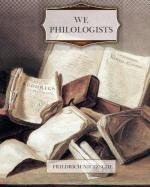124
There are domains of thought where the ratio will only give rise to disorder, and the philologist, who possesses nothing more, is lost through it and is unable to see the truth . e.g. in the consideration of Greek mythology. A merely fantastic person, of course, has no claim either . one must possess Greek imagination and also a certain amount of Greek piety. Even the poet does not require to be too consistent, and consistency is the last thing Greeks would understand.
125
Almost all the Greek divinities are accumulations of divinities . we find one layer over another, soon to be hidden and smoothed down by yet a third, and so on. It scarcely seems to me to be possible to pick these various divinities to pieces in a scientific manner, for no good method of doing so can be recommended: even the poor conclusion by analogy is in this instance a very good conclusion.
126
At what a distance must one be from the Greeks to ascribe to them such a stupidly narrow autochthony as does Ottfried Muller![10] How Christian it is to assume, with Welcker,[11] that the Greeks were originally monotheistic! How philologists torment themselves by investigating the question whether Homer actually wrote, without being able to grasp the far higher tenet that Greek art long exhibited an inward enmity against writing, and did not wish to be read at all.
127
In the religious cultus an earlier degree of culture comes to light a remnant of former times. The ages that celebrate it are not those which invent it, the contrary is often the case. There are many contrasts to be found here. The Greek cultus takes us back to a pre-Homeric disposition and culture. It is almost the oldest that we know of the Greeks—older than their mythology, which their poets have considerably remoulded, so far as we know it—Can this cult really be called Greek? I doubt it: they are finishers, not inventors. They preserve by means of this beautiful completion and adornment.
128
It is exceedingly doubtful whether we should draw any conclusion in regard to nationality and relationship with other nations from languages. A victorious language is nothing but a frequent (and not always regular) indication of a successful campaign. Where could there have been autochthonous peoples! It shows a very hazy conception of things to talk about Greeks who never lived in Greece. That which is really Greek is much less the result of natural aptitude than of adapted institutions, and also of an acquired language.
129
To live on mountains, to travel a great deal, and to move quickly from one place to another . in these ways we can now begin to compare ourselves with the Greek gods. We know the past, too, and we almost know the future. What would a Greek say, if only he could see us!
130
The gods make men still more evil; this is the nature of man. If we do not like a man, we wish that he may become worse than he is, and then we are glad. This forms part of the obscure philosophy of hate—a philosophy which has never yet been written, because it is everywhere the pudendum that every one feels.




